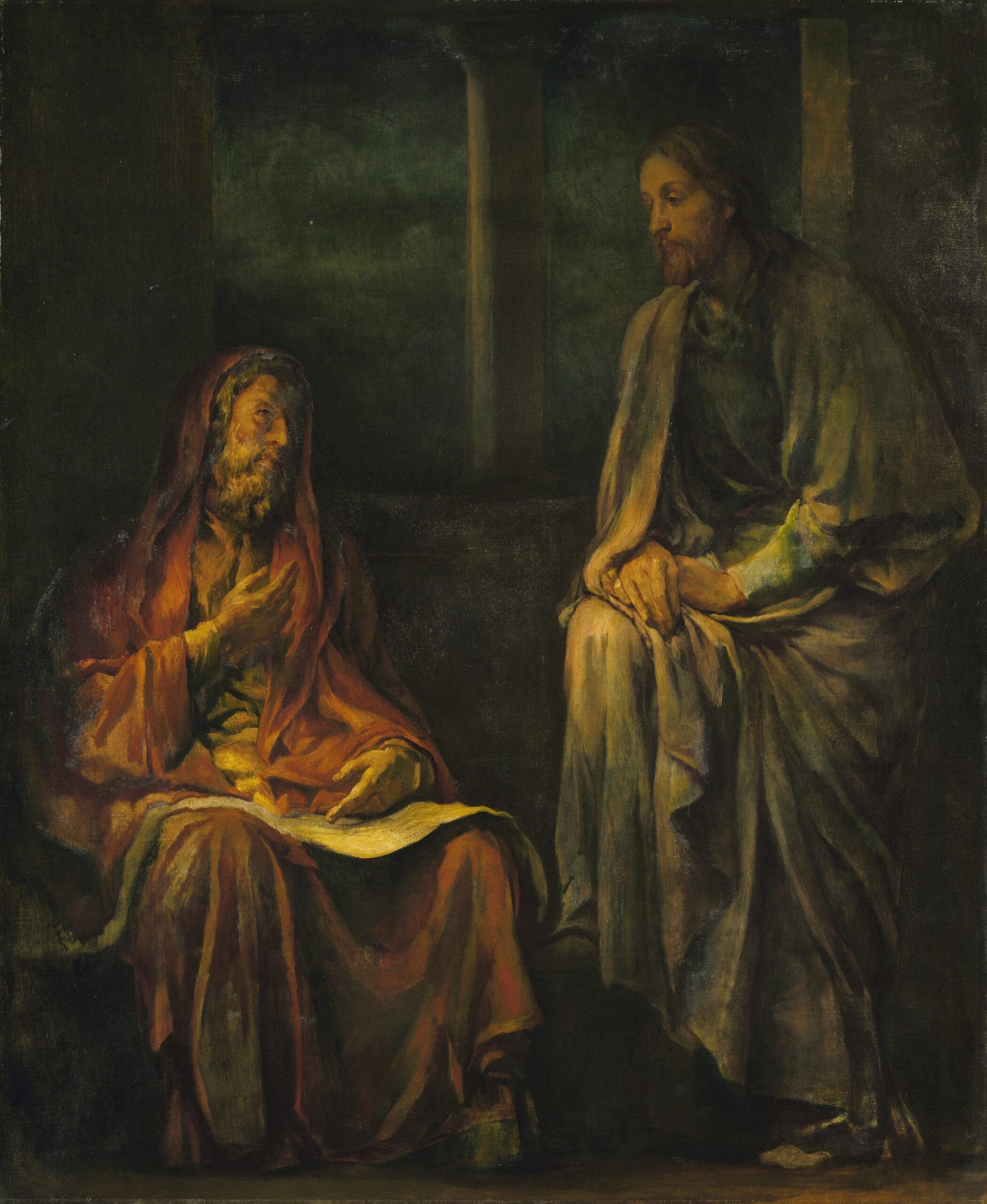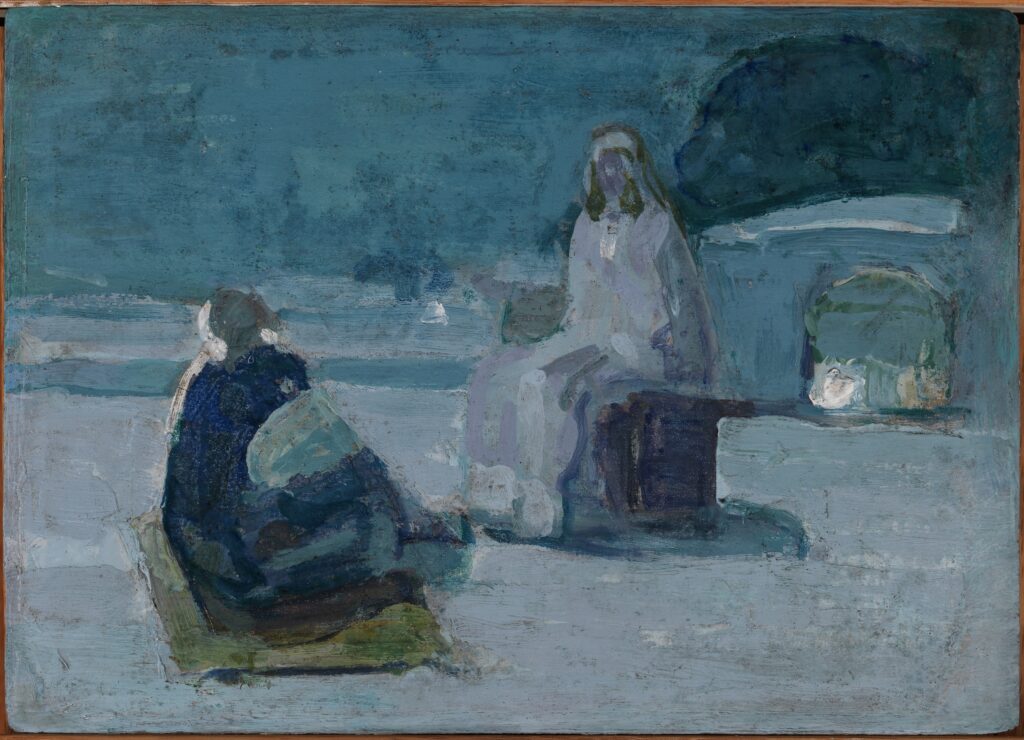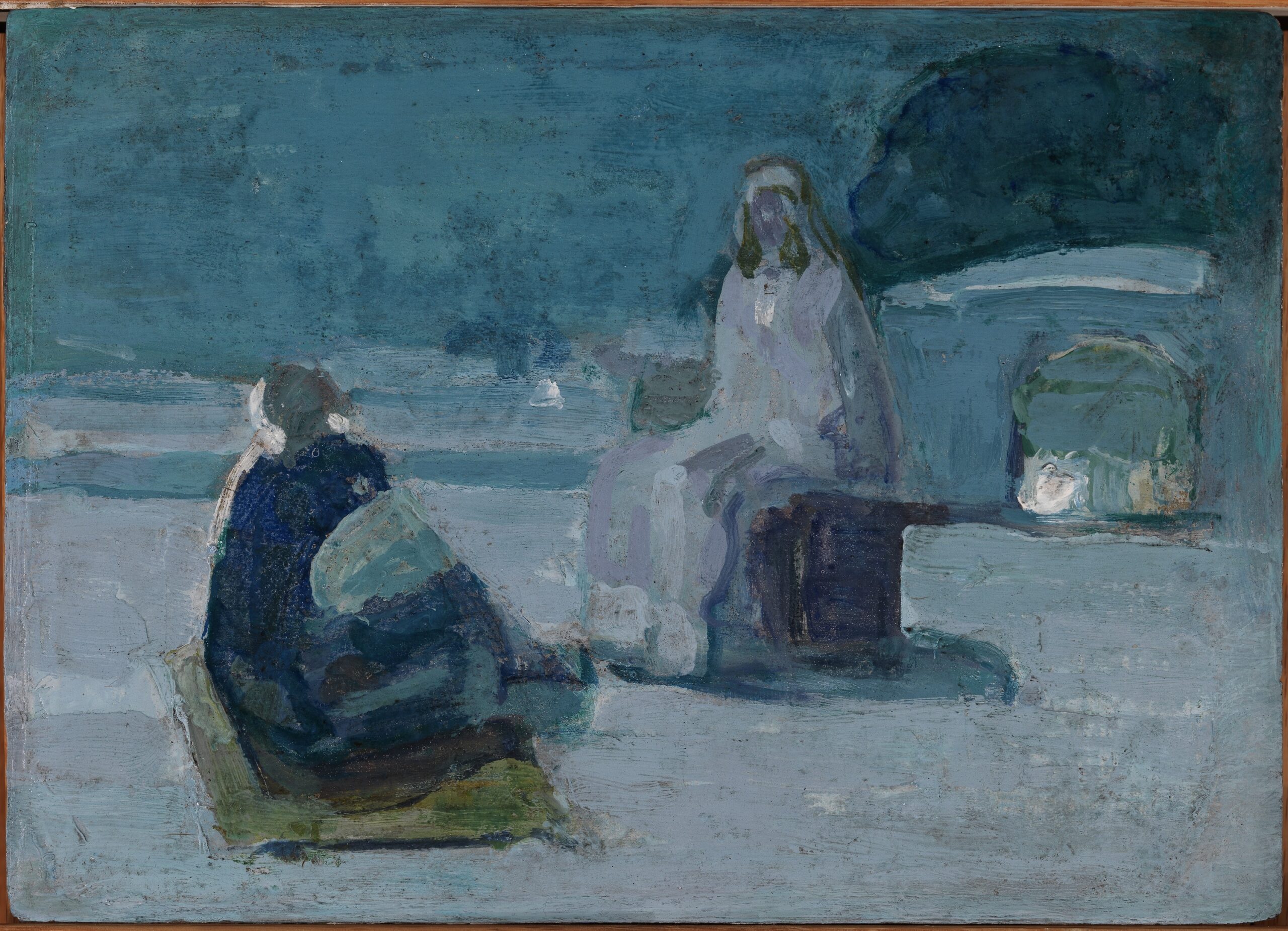This sermon was given at St. Augustine’s Episcopal Church, Washington, D.C. on March 14, 2021, Laetare Sunday. John 3.14-21 (lectionary for the day here).
I don’t know about you, but part of my childhood Sunday School experience was memorizing and reciting those words at the front of our small country church in Page County, not too far from D.C.:
“For God so loved the world that he gave his only Son, so that everyone who believes in him may not perish but may have eternal life.”
That one verse – 27 words, in our translation – has been set to music in all sorts of ways – none of which I will sing here – and has found its way to mugs and bumper stickers and greeting cards. In a sense, it contains everything we as Christians hold to be truth:
God loves the world
God became incarnate – God became a person, and lived and died
so that we would have life.
As I’ve been reading this passage in preparation for preaching today, I keep finding myself paying just as much attention, or more attention, to what happens before and after it. Today’s passage from the Gospel, including John 3:16, is part of a longer story that takes up most of the third chapter of John – the story of Nicodemus and Jesus – and even though I was trying to focus on this very important, very well-known verse, John 3:16, I couldn’t let go of that longer story, the conversation between Nicodemus and Jesus, especially after I happened across this painting from 1880, by John LaFarge.

The painting is actually here in Washington, D.C., in the collection of the Smithsonian American Art Museum, though according to the website it is not currently on display.
Here’s the scene: A stranger, Nicodemus, has come to see Jesus for the first time, secretly, under the cover of darkness, wanting to understand what Jesus has been teaching and preaching about, these ideas of God’s salvation and the baptism of the spirit and do unto others, and Jesus is trying to explain it to him. By the end of the conversation, it’s not completely clear whether he’s made any headway.
The conversation takes place in Jerusalem, the city where Jesus will eventually be arrested and executed – Jerusalem, the city kills its prophets, Jerusalem, the city that Jesus laments over in Matthew and Luke: “how often have I desired to gather your children together as a hen gathers her brood under her wings, and you were not willing!” By this point in John’s telling of the Gospel, Jesus has turned water into wine at the wedding at Cana. He has gone to the Temple in Jerusalem at the Passover in a fury, overturned the tables, whip in hand, and told the merchants and moneychangers to get out of his Father’s house. He has announced that if they tear down the Temple, he will raise it up again in three days – but as we know, he’s not talking about the temple building. He is watching his own death and resurrection grow closer.
Nicodemus is a Pharisee, a teacher and a religious leader, influential, likely wealthy, and he has surely heard the concerns about Jesus, the stories about how he threw everyone out of the Temple, the accusations of heresy.
But he has heard something else too,
something that rings true to him, something that speaks truth to him,
and so on this particular night, for whatever reason, he summons the courage to go visit Jesus and meet him face to face.
Perhaps he knocks on a door, perhaps he finds Jesus already there, expecting him – we don’t know. But I imagine them sitting down together, perhaps with cups of wine, studying each other. The first thing Nicodemus says to Jesus is honest, straightforward, and perhaps he takes a deep breath before he says it, because he must also know that it is an unpopular opinion, perhaps even a dangerous opinion, with some people in Jerusalem. He says: “Rabbi, we know you are a teacher who has come from God.”
Rabbi, we know you are a teacher who has come from God. Because no one who is doing what you are doing could be anything except someone who has come from God.
Nicodemus is sure about this, but the rest of Jesus’ words he is still trying to understand.
LaFarge and I aren’t the only ones who’ve tried to imagine this conversation. Here is another image from the Smithsonian, a 1923 study by African-American artist Henry Ossawa Tanner. The nighttime meeting between Jesus and Nicodemus brought back memories of his own childhood, when formerly enslaved people continued to worship and read the Bible under the cover of nightfall, even after Emancipation.

After nightfall, Jesus and Nicodemus sit together, in lamplight, or maybe outside in moonlight, and Jesus tries to explain to Nicodemus what he has come to this world to tell all of us. No one can enter the Kingdom of God without being born from above, Jesus tells him. Nicodemus struggles with that idea – how can an old man be born again? Jesus talks about baptism by water and baptism by spirit.
How can these things be? asks Nicodemus.
You’re a teacher, says Jesus. How can you not understand these things?
And Jesus reminds Nicodemus of our Old Testament reading today, saying: Just as Moses lifted up the serpent in the wilderness – the Son of God must be lifted up. Nicodemus must be thinking, lifted up – what, glorified, on a throne? On a mountain? On a horse at the front of an army? He can’t possibly have in mind what Jesus knows, that his glorification will be on a cross, the most humiliating and brutal of the Roman Empire’s punishments.
But Jesus doesn’t get into that. He doesn’t tell Nicodemus that he is walking toward Good Friday. He just tells him the truth:
“For God so loved the world that he gave his only Son, so that everyone who believes in him may not perish but may have eternal life.”
God so loved the world. God did not send the Son into the world to condemn the world, but in order that the world might be saved through him.
God loves the world.
Today, the fourth Sunday of Lent, has another name – it is called Laetare Sunday – laetare is from Latin, and it means to rejoice, or to gladden – to be joyful, and to bring joy to others. It might seem out of place in the middle of Lent, when we’re still weeks away from Easter, and still have Maundy Thursday and Good Friday to go through before we get there. We still have penance to do, and some of us are feeling the guilt of being three weeks into Lent and realizing we’ve done a terrible job at keeping up with our Lenten disciplines. And that doesn’t even include all our continuing worry about vaccines and politics.
This does not feel like the time for rejoicing.
But remember back to Ash Wednesday, and the soil and seeds we received from Scott at the beginning of this long journey, and remember, he told us, we are walking on fallow soil, not barren. We are walking on ground that is waiting for rebirth. We are carrying with us seeds, remember, that we will plant in those handfuls of earth and watch grow into new life. And in a sense, we are the soil we walk on – we are fallow ground, waiting to hold seeds, and for light and rain to wake up the life within us. That is reason for rejoicing.
I believe there is reason for rejoicing in the story of Nicodemus, the stranger who came to Jesus’ door and was met not with suspicion or argument – or condemnation – but with the love of God, in the hospitality of his Son. A quiet conversation, a shared cup of wine, a prayer before he left.
I suspect Nicodemus left as quietly as he had come, maybe covering his head, looking to see if anyone in the streets had seen him visiting this controversial, rebellious, blasphemous young activist named Jesus. He was still confused by Jesus’ words, unsure about this idea of being born again, of the idea of the world being saved, of eternal life, still in some doubt as to whether this man really was who he said he was, the Son of God. But in the chapters to come, we hear more from Nicodemus. He challenges the authorities, speaks up to defend Jesus. And at the end that is not the end, on the day when sunlight turns to midnight, Nicodemus is among those who take Jesus’ body off the cross, carry him to the tomb and bury him with respect, with love and with grief.
Nicodemus first comes to Jesus secretly, afraid to be seen, but drawn by the goodness and truth he finds in Jesus. Nicodemus, we could say, is fallow ground, empty, waiting for new life. Somewhere in the weeks between the darkest night and the darkest day, Nicodemus is changed, and on the day that Jesus is buried, those seeds begin to grow.
And that is what happens to us, while we’re on this Lenten journey. We change. We are transformed, though it may be hard to see while we’re in the middle of it. We are fallow ground, waiting for new life. We feel exhaustion, anxiety – we are afraid, and we are grieving for so much and so many we have lost. We’re struggling on the uphills, and getting lost, and sometimes don’t feel like we’re moving at all. But there is reason for rejoicing, even in the muddle of Lent – because the message behind all of it is: God loves the world. That’s the big idea. God loves the world. And so he gave his Son, and it wasn’t easy, and this isn’t easy, but at the beginning and at the end of it all, Jesus is there, ready to sit down with us, hear our questions, even in the middle of the night, and tell us, again, that God loves us.
And knowing that, we also know that our work in Lent isn’t about proving ourselves to God. Jesus does not say, “whoever has perfect faith, who does everything they promised to do for Lent, who never gets angry or resentful or impatient or selfish or thoughtless will have eternal life.” Jesus says, “whoever believes.”
Believing means taking our anger and our resentment and our impatience and our selfishness and our thoughtlessness to God and saying, “help me.” Believing means taking the first, scary step that Nicodemus took that night in Jerusalem, that conversation with a stranger. Believing means that even if we are not strong enough yet to meet Jesus in the daylight, he’ll be there anyway. Believing means knowing that we are loved. Believing means knowing that the world is loved, and in turn loving the world ourselves. Believing means allowing ourselves to be fallow ground, acknowledging what we know and what we do not know and seeking to understand, acknowledging when we sin and seeking to do what is good and just, being open to the change that happens when we do that Lenten work of repentance and transformation.
And that is reason for rejoicing.
Below, video of the full service, from St. Augustine’s Facebook page:
